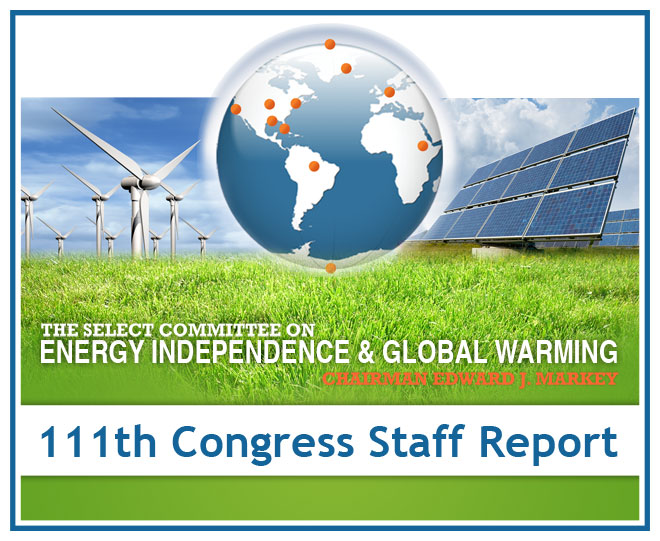111th Congress Staff Report

To read the full Report, please CLICK HERE
To read a copy of the Select Committee Report from the 110th Congress, CLICK HERE
Introduction
We are at a watershed moment in the history of energy production—and the choices we make at this juncture will determine the fate of our planet and the national security and economic future of the United States. Between now and 2030, roughly $26 trillion will be invested in energy infrastructure worldwide. Clean energy will likely make up an increasing share of this investment with every passing year. The International Energy Agency (IEA) estimates that $5.7 trillion will be invested in renewable electricity generation alone between 2010 and 2035.1 This new infrastructure is long-lived and costly, and the decisions made in the next decade will set the course of the global and U.S. energy system—and of the global climate—for the next century and beyond. This transition also presents an unprecedented opportunity for economic growth and job creation in the clean energy technology sector. Other countries are taking the lead in clean energy and the United States must act now if it is to remain competitive in this rapidly developing global market.
Global climate change presents one of the gravest threats to our planet’s health, and to America’s economy, its national security, and its public health. Scientists warn that we may be approaching a tipping point, after which it will become increasingly difficult, or perhaps impossible, to halt global warming and its catastrophic effects. The United States confronts this issue at the same time it faces a deepening energy crisis—characterized by skyrocketing prices, high dependence on foreign oil, and continued reliance on high-carbon fuels that worsen the climate crisis.
The Select Committee on Energy Independence and Global Warming was created by Speaker of the House Nancy Pelosi in 2007 to examine and make recommendations on the interrelated issues of energy independence, national security, America’s economic future and global warming.
During its four years, the Select Committee held 80 hearings and briefings, conducted investigations, led fact finding trips with Congressional members, and contributed to the most active four years in energy and climate policy development and debate in the United States Congress.
As a result of the Select Committee’s work in raising the profile of energy and climate issues, and spurring increased debate, the House of Representatives passed several pieces of legislation that will reduce our nation’s consumption of foreign oil, increase energy efficiency, and create new jobs in the clean energy sector.
In 2007, the first year of the Select Committee, the House passed the Energy Independence and Security Act, which included fuel economy provisions co-authored by Rep. Edward J. Markey, Chairman of the Select Committee. The bill also increased America’s use of advanced biofuels, and updated energy efficiency standards for appliances and lighting systems.
The Select Committee also was instrumental in pushing for increased investment in clean energy technologies. The American Recovery and Reinvestment Act of 2009 invested $90 billion in clean energy, which jump-started new domestic industries like advanced electric batteries, boosted household energy efficiency, and helped key renewable energy sectors like wind and solar avoid collapse during the recession.
In June of 2009, the House passed the Waxman-Markey American Clean Energy and Security Act, the first passage of a comprehensive energy and climate bill in the history of the U.S. Congress. The bill set ambitious carbon reduction targets, which were used by U.S. negotiators to craft the Copenhagen Accord. It also created a roadmap to create clean energy jobs and the next generation of clean energy technologies.
These legislative achievements happened as historic events indicated that swift action was needed to address a strained energy system and a dangerously destabilized climate. The years 2007-2010 are all in the top ten warmest years on record, according to NASA. Oil and gasoline prices peaked to record levels in 2007 and are on the rise again as the country emerges from the recession.
As the Select Committee ends its tenure of progress, it is clear that there is much left to be done to stabilize our global climate, and spur the development of clean energy technology and jobs here in America.
This report summarizes the results and findings of the Select Committee’s hearings and investigations, highlights legislative accomplishments that flow from the information it has developed and makes recommendations for steps moving forward.
The Select Committee was active during the 110th and 111th Congresses. This is an archived version of the website, to ensure that the public has ongoing access to the Select Committee record. This website, including external links, will not be updated after Jan. 3rd, 2010.
![]() del.icio.us
del.icio.us
![]() Digg this
Digg this
![]() Reddit
Reddit
![]() Stumbleupon
Stumbleupon



